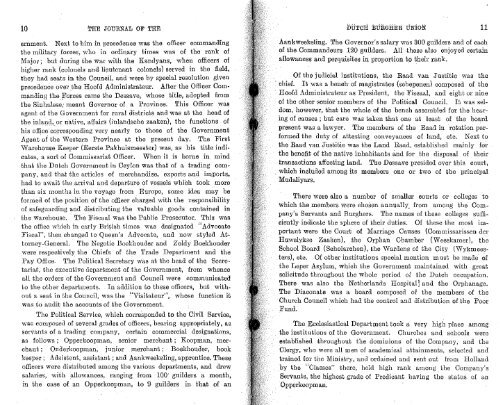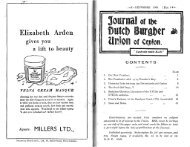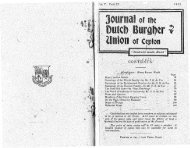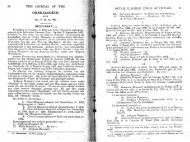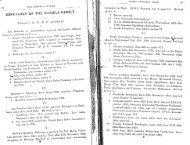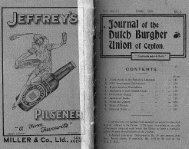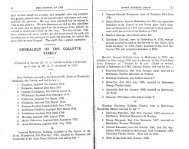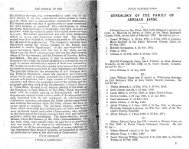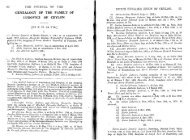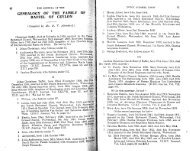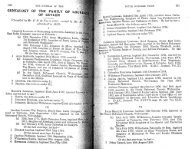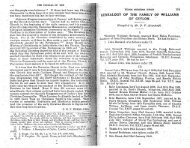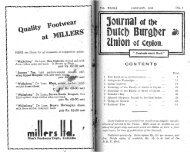Journal of the - Dutch Burgher Union of Ceylon
Journal of the - Dutch Burgher Union of Ceylon
Journal of the - Dutch Burgher Union of Ceylon
Create successful ePaper yourself
Turn your PDF publications into a flip-book with our unique Google optimized e-Paper software.
10 *HB JOURNAL OF THE<br />
emmeiit. Next to him in precedence was <strong>the</strong> <strong>of</strong>ficer commanding<br />
<strong>the</strong> military forces, who in ordinary times was <strong>of</strong> <strong>the</strong> rank <strong>of</strong><br />
Major; but during <strong>the</strong> war with <strong>the</strong> Kandyans, when <strong>of</strong>ficers <strong>of</strong><br />
higher rank (colonels and lieutenant colonels) served in <strong>the</strong> field,<br />
<strong>the</strong>y had seats in <strong>the</strong> Council, and were by special resolution given<br />
precedence over <strong>the</strong> Ho<strong>of</strong>d Administrates. After <strong>the</strong> Officer Commanding<br />
<strong>the</strong> Forces came <strong>the</strong> Dessave, whose title, adopted from<br />
<strong>the</strong> Sinhalese,'meant Governor <strong>of</strong> a Province. This Officer was<br />
agent <strong>of</strong> <strong>the</strong> Government for rural districts and was at <strong>the</strong> head <strong>of</strong><br />
<strong>the</strong> inland, or native, affairs (inlandsche zaaken), <strong>the</strong> functions <strong>of</strong><br />
his <strong>of</strong>fice, cor responding very nearly to those <strong>of</strong> <strong>the</strong> Government<br />
Agent <strong>of</strong> <strong>the</strong> Western Province at <strong>the</strong> present day. The First<br />
Warehouse Keeper (Eerste Pakhuisraeester) was, as his title indicates,<br />
a sort <strong>of</strong> Commissariat Officer. When it is borne in mind<br />
that <strong>the</strong> <strong>Dutch</strong>. Government in <strong>Ceylon</strong> was that <strong>of</strong> a trading company,<br />
and that <strong>the</strong> articles <strong>of</strong> merchandise, exports and imports,<br />
had to await <strong>the</strong>,arrival and departure <strong>of</strong> vessels which took more<br />
than six months in <strong>the</strong> voyage from Europe, some idea may be<br />
formed <strong>of</strong> <strong>the</strong> position <strong>of</strong> <strong>the</strong> <strong>of</strong>ficer charged with <strong>the</strong> responsibility<br />
<strong>of</strong> safeguarding and distributing <strong>the</strong> valuable goods contained in<br />
<strong>the</strong> warehouse. The Fiscaal was <strong>the</strong> Public Prosecutor. This was<br />
<strong>the</strong> <strong>of</strong>fice wliich in early British times was designated Advocate<br />
Fiscal", <strong>the</strong>n changed to Queen's Advocate, and now styled Attorney-General.<br />
The Negotie Boekhouder and Zoldy Boekhouder<br />
were respectively <strong>the</strong> Chiefs <strong>of</strong> <strong>the</strong> Trade Department and <strong>the</strong><br />
Pay Office. The Political Secretary was at <strong>the</strong> head <strong>of</strong> <strong>the</strong> Secretariat,<br />
<strong>the</strong> executive department <strong>of</strong> <strong>the</strong> Government, from whence<br />
all <strong>the</strong> orders <strong>of</strong> <strong>the</strong> Government and Council were communicated<br />
to <strong>the</strong> o<strong>the</strong>r departments. . In addition to <strong>the</strong>se <strong>of</strong>ficers, but without<br />
a seat in <strong>the</strong> Council, was <strong>the</strong> "Visitateur", whose function it<br />
was to audit <strong>the</strong> accounts <strong>of</strong> <strong>the</strong> Government.<br />
The Political Service, which corresponded to <strong>the</strong> Civil Service,<br />
was composed <strong>of</strong> several grades <strong>of</strong> <strong>of</strong>ficers, bearing appropriately, as<br />
servants <strong>of</strong> a trading company, certain commercial designations,<br />
as follows ; Opperkoopman, senior merchant ; Koopman, merchant<br />
; Onderkoopman, junior merchant; Boekhouder, book<br />
keeper ; Adsistent, assistant; and Aankweokeling, apprentice. These<br />
<strong>of</strong>ficers were distributed among <strong>the</strong> various departments, and drew<br />
salaries, with allowances, ranging from 100' guilders a month,<br />
in <strong>the</strong> case <strong>of</strong> an Opperkoopman, to 9 guilders in that <strong>of</strong> an<br />
bUTCH BURGHER UNION 11<br />
Aankweekeling. The Governor's salary was 300 guilders and <strong>of</strong> each<br />
<strong>of</strong> <strong>the</strong> Commandeurs 120 guilders. Air <strong>the</strong>se also enjoyed certain<br />
allowances and perquisites in proportion to <strong>the</strong>ir rank.<br />
Of <strong>the</strong> judicial institutions, <strong>the</strong> Eaad van Justitie was <strong>the</strong><br />
chief. It was a bench <strong>of</strong> magistrates (schepenen) composed <strong>of</strong> <strong>the</strong><br />
Ho<strong>of</strong>d Administrates as President, <strong>the</strong> Fiscaal, and eight or nine<br />
<strong>of</strong> <strong>the</strong> o<strong>the</strong>r senior members <strong>of</strong> <strong>the</strong> Political Council. It was seldom,<br />
however, that <strong>the</strong> whole <strong>of</strong> <strong>the</strong> bench assembled for <strong>the</strong> hearing<br />
<strong>of</strong> causes ; but care was taken that one at least <strong>of</strong> <strong>the</strong> board<br />
present was a lawyer. The members <strong>of</strong> <strong>the</strong> Eaad in rotation performed<br />
<strong>the</strong> duty <strong>of</strong> attesting conveyances <strong>of</strong> land, etc. Next to<br />
<strong>the</strong> Eaad van Justitie was <strong>the</strong> Land Eaad, established mainly for<br />
<strong>the</strong> benefit <strong>of</strong> <strong>the</strong> native inhabitants and for <strong>the</strong> disposal <strong>of</strong> <strong>the</strong>ir<br />
transactions affecting land. The Dessave presided over this court,<br />
which included among its members one or two <strong>of</strong> <strong>the</strong> principal<br />
Mudaliyars.<br />
There were also a number <strong>of</strong> smaller courts or colleges to<br />
which <strong>the</strong> members were chosen annually^ from among <strong>the</strong> Company's<br />
Servants and <strong>Burgher</strong>s. The names <strong>of</strong> <strong>the</strong>se colleges sufficiently<br />
indicate <strong>the</strong> sphere <strong>of</strong> <strong>the</strong>ir duties. Of <strong>the</strong>se <strong>the</strong> most important<br />
were <strong>the</strong> Court <strong>of</strong> Marriage Causes (Commissarissen der<br />
Huwelykse Zaaken), <strong>the</strong> Orphan Chamber (Weeskaraer), <strong>the</strong><br />
School Board (Scholarchen), <strong>the</strong> Wardens <strong>of</strong> <strong>the</strong> City (Wykmeesters),<br />
etc. Of o<strong>the</strong>r institutions special mention must be made <strong>of</strong><br />
<strong>the</strong> Leper Asylum, which <strong>the</strong> Government maintained with great<br />
solicitude throughout <strong>the</strong> whole period <strong>of</strong> <strong>the</strong> <strong>Dutch</strong> occupation,<br />
There was also <strong>the</strong> Ne<strong>the</strong>rlands Hospital' and <strong>the</strong> Orphanage.<br />
The Diaconate was a board composed <strong>of</strong> <strong>the</strong> members <strong>of</strong> <strong>the</strong><br />
Church Council which had <strong>the</strong> control and distribution <strong>of</strong> <strong>the</strong> Poor<br />
Fund.<br />
The Ecclesiastical Department took a very high place among<br />
<strong>the</strong> institutions <strong>of</strong> <strong>the</strong> Government. Churches and schools were<br />
established throughout <strong>the</strong> dominions <strong>of</strong> <strong>the</strong> Company, and <strong>the</strong><br />
Clergy, who were all men <strong>of</strong> academical attainments, selected and<br />
trained for <strong>the</strong> Ministry, and ordained and sent out from Holland<br />
by <strong>the</strong> "Classes" <strong>the</strong>re, held high rank among <strong>the</strong> Company's<br />
Servants, <strong>the</strong> highest grade <strong>of</strong> Predicant having <strong>the</strong> status <strong>of</strong> an<br />
Opperkoopman,


